Types Of PrepositionPrepositions appear in several of our sentences, and they are among the most widely used English words. Prepositions are an important aspect of grammar because they allow us to compose interesting, complex sentences. 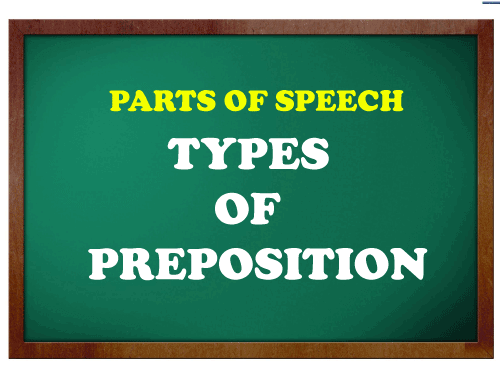
A preposition, for instance, might transform a mundane sentence like "We ran" into "We rushed to the enchanting palace in the fairy jungle." Before we get into the types of the preposition, let us first try and understand what preposition is. What exactly is a preposition?"A preposition refers to the words that illustrate the linkage between the nouns and other words in the sentence. They describe the sequences, spaces, and logic linkages between the statement's object and the remainder of the sentence. They assist us in understanding order, time links, and positions." Example:
There are a few grammatical facts about prepositions that are worth noting.
because of, in case of, instead of, by way of, on behalf of, on account of, in care of, in spite of, on the side, etc. Types of Preposition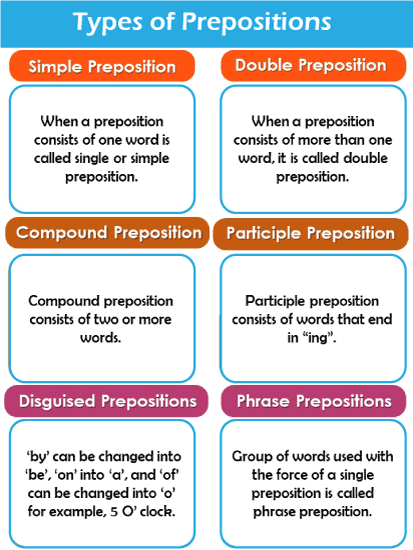
1. Simple PrepositionIt is the most common type of preposition. "Simple Prepositions are the prepositions utilized to express the connection that a sentence's Nouns and Pronouns have with the remaining of the terms in it." In regard to Complex Sentence and Compound Sentence, they are frequently employed to connect two clauses. Some of the common/simple prepositions are;
Some of the examples of simple prepositions are;
2. Double PrepositionNext in the list of types of preposition is the double preposition. "In this, two simple prepositions merge to form one that links the Noun(s) or Pronoun(s) to the remaining words in a phrase." Some of the double preposition are;
Some of the examples of double preposition are;
3. Compound PrepositionNext in the list of types of preposition is the compound preposition. Prepositions along with other words or terms are combined to form compound prepositions. Note: Compound Prepositions are most often confused with Double Prepositions because they both need other prepositions or terms to serve as a preposition.Some of the compound preposition are;
Some of the examples of compound prepositions are;
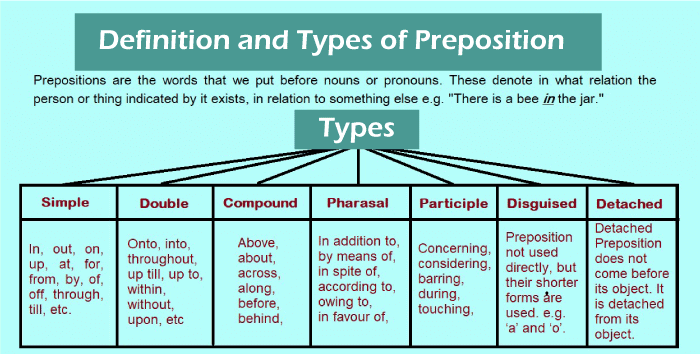
4. Participle PrepositionParticiple Prepositions can be of two types- Present Participles (-ing) and Past Participles (-ed and -en), which are employed as Prepositions rather than Verbs. These are both participles and prepositions. Participle prepositions usually end with a suffix such as -ed/en and -ing. Some of the participle preposition are;
Some examples of particle preposition are;
Particles vs. PrepositionsAlthough prepositions and particles appear to be the same, they perform different tasks in a statement. A particle is a term that depends on another term for its definition/ value and does not exist by itself, such as the term to when it follows a verb (to move, drink, or fly) or the term up when it creates a phrasal verb, such as lighten up. (Though certainly, up has its own significance, but in a word like lighten up, it does not relate to a specific area!) You can see how identifying whether a term in a statement is acting as a particle or a preposition can be difficult. The phrase "despite his wounds, the goalkeeper played on" here the term on is functioning as the particle. It is closely connected to the verb play. Whereas, if we say, "Kids played on the grass and their hands are dirty" then in this sentence on grass is a prepositional phrase, as it is describing where their kids played. So, on is a preposition here. 5. Disguised PrepositionsThese prepositions are frequently disguised as other components of the English language. In statements, these prepositions are frequently disguised as "a" and "o." A hidden preposition that is not actually used or utilized in a phrase but is addressed indirectly is known to as an indirect preposition. Some of the examples of disguised prepositions are;
6. Detached PrepositionDetached Preposition refers to a preposition which has been detached and moved to the ending of a statement. Such preposition is usually separated from the interrogative or relative pronouns and adverbs for the sake of sentence structure. Have a look at few of the examples of disguised prepositions are;
7. Time PrepositionsPrepositions of time indicate the connection of time between noun and the remaining words of the sentence. The most common time prepositions are;
Examples of time prepositions are;
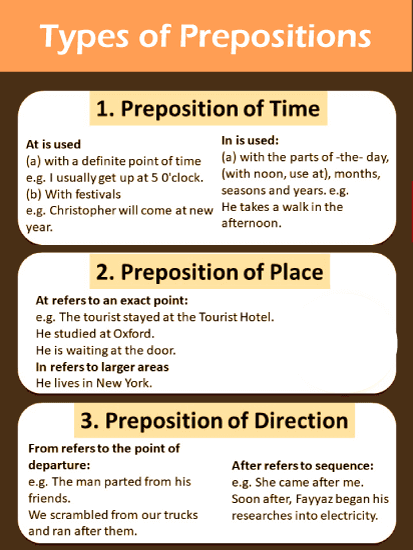
8. Place and Direction PrepositionsPrepositions of place depict the correlation of place amongst nouns and the rest of the sentence. The most common place/direction prepositions are
Some examples of place and direction prepositions are;
9. Agent or thing prepositionsAgent or thing prepositions establish a causal relation amongst nouns and other components of the statement. The most common and widely used prepositions of agents or objects are of, for, by, with, about, and so on.
10. Prepositions in Phrasal PhrasesA phrasal preposition is not the prepositional phrase but rather a grouping of two or more terms that serve as the prepositions. The most prevalent phrasal prepositions are mentioned in the table below;
Some of the examples of phrasal preposition are;
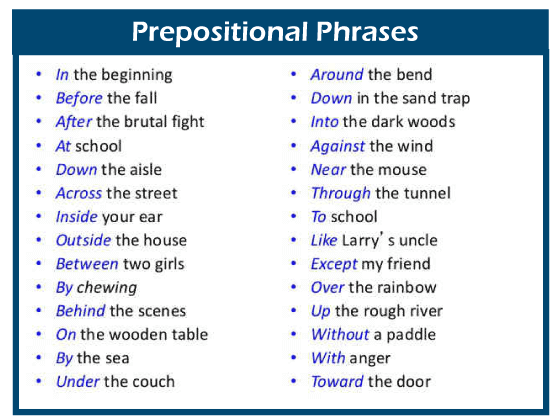
Using PrepositionsPrepositions are terms that indicate a relationship. Without the usage of a preposition, a statement would be meaningless. There are various types of prepositions utilized in the English language, which not only add detail but also finish a sentence. Prepositions are utilized to convey information such as place, time, direction, causation, and possession.
Next TopicPreposition Examples
|
 For Videos Join Our Youtube Channel: Join Now
For Videos Join Our Youtube Channel: Join Now
Feedback
- Send your Feedback to [email protected]
Help Others, Please Share









